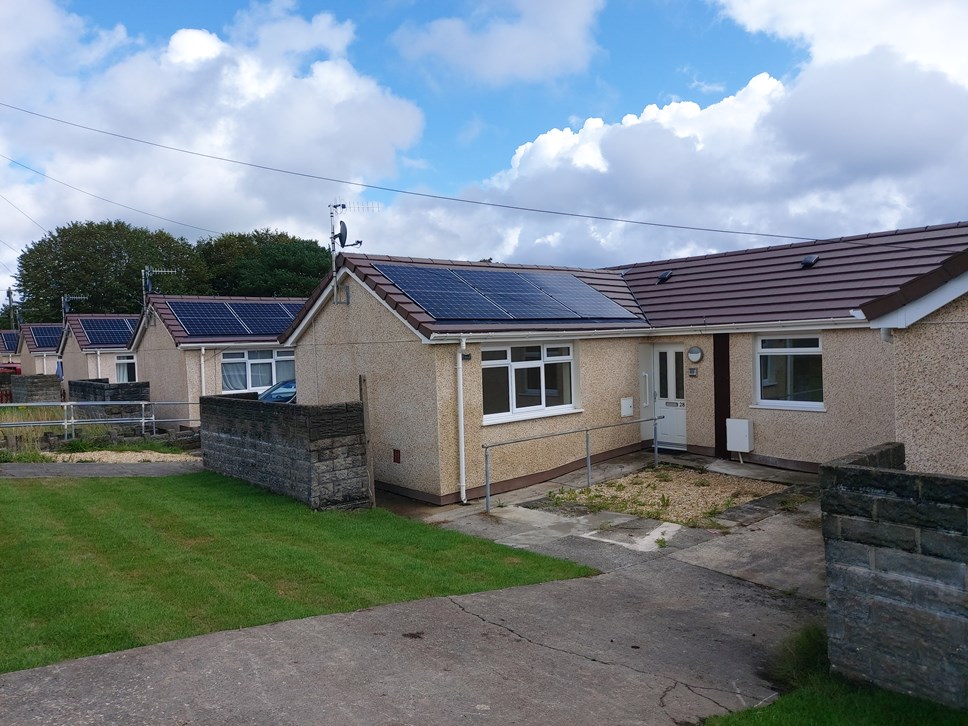
£9.5m programme to reduce housing’s carbon footprint
Rhaglen £9.5 miliwn i leihau ôl troed carbon y sector tai
A new programme worth up to £9.5m million will reduce the carbon footprint of existing social housing in Wales, make energy bills more manageable for residents and provide new job and training opportunities.
The Optimised Retrofit Programme (ORP), part of the Innovative Housing Programme, will fund the fitting of energy efficiency measures in up to 1000 existing homes owned by registered social landlords and councils. The investment package will lead to better homes, help tackle fuel poverty and contribute to decarbonisation.
Julie James, Minister for Housing and Local Government, launched the Optimised Retrofit Programme during a visit to Craig Cefn Parc in Swansea. This retro fit scheme of six 1970s bungalows undertaken by Swansea Council trials an approach of how to reduce residents energy bills, improve tenant comfort and reduce carbon emissions.
The ORP will support the sector to test different approaches to reach the goal of carbon neutrality. It will include an innovation competition - opening next month - to support the piloting of innovative new solutions for retrofitting our housing stock. The knowledge and learning gained will influence the future of the Welsh Housing Quality Standard so that all those living in social homes will benefit from reduced energy bills and warmer, more efficient homes.
ORP is a key part of the £45m Innovative Housing Programme announced earlier this year, which focuses on building new carbon neutral homes using modern methods of construction, the scheme will contribute to plans to reduce greenhouse gases by 95% by 2050 with an ambition to reach net zero in future. Applications for the Innovative Housing Programme’s fourth year are now officially open.
A collaboration across Welsh Government, the programme has been part funded through the innovation and business streams. It has long been recognised that retrofitting homes will be a key tool in the green economic recovery, with the ambition the programme will create jobs, provide training and skills in both existing and new retrofit and heating technology.
It is hoped technologies and skills created through the programme can be rolled out across wider private sector homes, ensuring Wales’ place as ‘first mover region’ for decarbonisation of homes by reducing carbon emissions from around 300,000 social and fuel poor homes.
Announcing the plans, the Minister for Housing and Local Government, Julie James said:
“The coronavirus pandemic has highlighted the importance of a warm, secure and affordable home like never before. It has also shown the positive effects of reducing greenhouse gasses.
“Housing is responsible for 27% of all energy consumed in Wales and 15% of all demand side greenhouse gas emissions. While we have plans in place to ensure new homes are heated and powered only from clean energy sources, ensuring our existing housing stock is as energy efficient as possible is vital to if we are to meet our ambitious target of reducing our greenhouse gas emissions by 95% by 2050.
This scheme is essential to tackling climate change, and driving down household energy costs now and in the future. Helping people, including those on lower incomes, to reduce their fuel bills while keeping their homes warm.
Economy Minister Ken Skates said:
“A welcome boost to the Welsh economy, retrofitting homes will provide quality jobs and training opportunities in the heart of our communities. To help drive forward innovation and build a Welsh supply chain we will be launching a competition for social landlords to apply for research and innovation funding in September.”
Clarissa Corbisiero, Deputy Chief Executive and Director of Policy and External Affairs at Community Housing Cymru said:
“Despite the immediate threat of Covid-19, the climate emergency has not gone away, and the pandemic has only highlighted the need for more good quality, affordable homes. Housing associations in Wales are committed to playing their part in tackling these issues. We now have an opportunity to learn from the experiences of the last few months, and be ambitious in our response. This funding is a welcome first step to decarbonise 1,000 homes, build local supply chains and create jobs in our communities.”
ENDS
